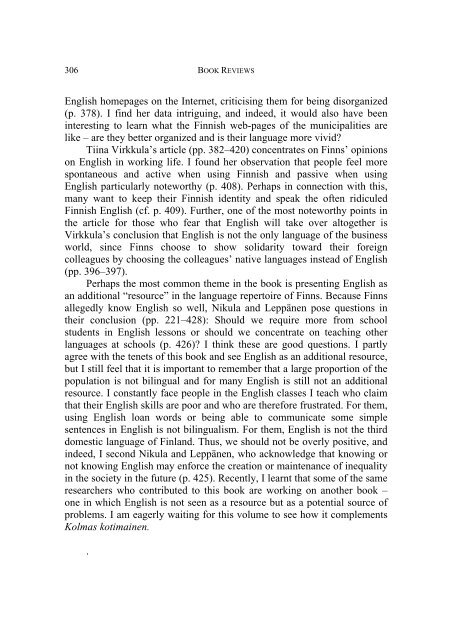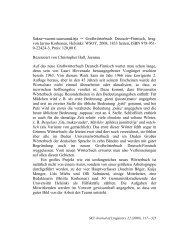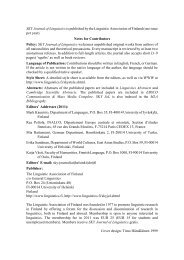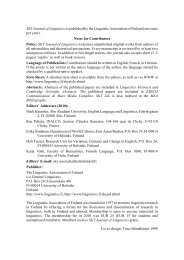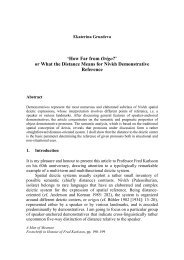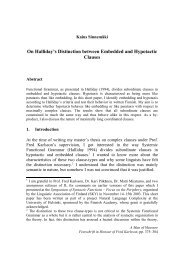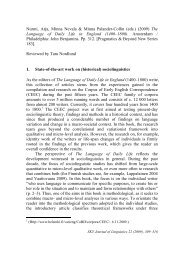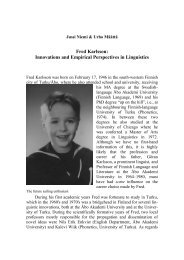Leppänen, Sirpa, Tarja Nikula & Leila Kääntä (eds.) (2008) Kolmas ...
Leppänen, Sirpa, Tarja Nikula & Leila Kääntä (eds.) (2008) Kolmas ...
Leppänen, Sirpa, Tarja Nikula & Leila Kääntä (eds.) (2008) Kolmas ...
You also want an ePaper? Increase the reach of your titles
YUMPU automatically turns print PDFs into web optimized ePapers that Google loves.
306<br />
BOOK REVIEWS<br />
English homepages on the Internet, criticising them for being disorganized<br />
(p. 378). I find her data intriguing, and indeed, it would also have been<br />
interesting to learn what the Finnish web-pages of the municipalities are<br />
like – are they better organized and is their language more vivid?<br />
Tiina Virkkula’s article (pp. 382–420) concentrates on Finns’ opinions<br />
on English in working life. I found her observation that people feel more<br />
spontaneous and active when using Finnish and passive when using<br />
English particularly noteworthy (p. 408). Perhaps in connection with this,<br />
many want to keep their Finnish identity and speak the often ridiculed<br />
Finnish English (cf. p. 409). Further, one of the most noteworthy points in<br />
the article for those who fear that English will take over altogether is<br />
Virkkula’s conclusion that English is not the only language of the business<br />
world, since Finns choose to show solidarity toward their foreign<br />
colleagues by choosing the colleagues’ native languages instead of English<br />
(pp. 396–397).<br />
Perhaps the most common theme in the book is presenting English as<br />
an additional “resource” in the language repertoire of Finns. Because Finns<br />
allegedly know English so well, <strong>Nikula</strong> and <strong>Leppänen</strong> pose questions in<br />
their conclusion (pp. 221–428): Should we require more from school<br />
students in English lessons or should we concentrate on teaching other<br />
languages at schools (p. 426)? I think these are good questions. I partly<br />
agree with the tenets of this book and see English as an additional resource,<br />
but I still feel that it is important to remember that a large proportion of the<br />
population is not bilingual and for many English is still not an additional<br />
resource. I constantly face people in the English classes I teach who claim<br />
that their English skills are poor and who are therefore frustrated. For them,<br />
using English loan words or being able to communicate some simple<br />
sentences in English is not bilingualism. For them, English is not the third<br />
domestic language of Finland. Thus, we should not be overly positive, and<br />
indeed, I second <strong>Nikula</strong> and <strong>Leppänen</strong>, who acknowledge that knowing or<br />
not knowing English may enforce the creation or maintenance of inequality<br />
in the society in the future (p. 425). Recently, I learnt that some of the same<br />
researchers who contributed to this book are working on another book –<br />
one in which English is not seen as a resource but as a potential source of<br />
problems. I am eagerly waiting for this volume to see how it complements<br />
<strong>Kolmas</strong> kotimainen.<br />
.


